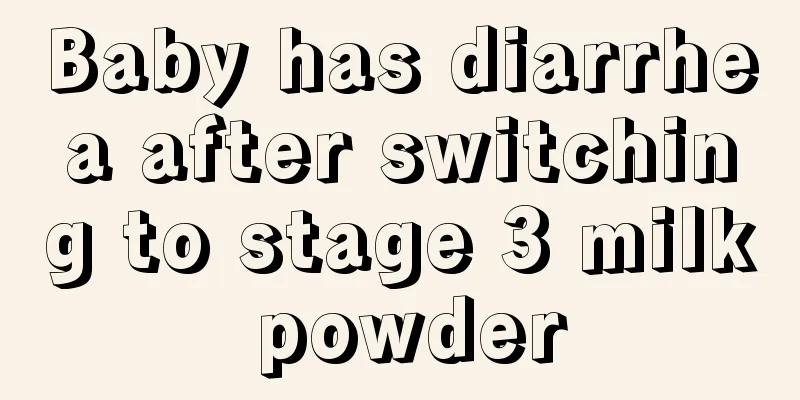Baby has diarrhea after switching to stage 3 milk powder

|
As babies grow up, the nutrition they need is generally different, and the milk powder also needs to be changed. Some babies have diarrhea when they switch from stage 2 milk powder to stage 3 milk powder. In fact, this is normal. Generally, in this case, the baby's stomach needs some time to adapt. At this time, parents need to add stage 3 milk powder little by little. They cannot change the baby directly at one time. The baby needs some time to adapt. Reasons for diarrhea when changing baby formula There are two reasons why babies develop diarrhea after changing milk powder. The first is that the baby cannot absorb the nutrients in the milk powder, such as lactose intolerance. In this case, it is necessary to switch to another milk powder. In most cases, babies get diarrhea when changing milk powder because of frequent changes in milk powder or improper methods of changing milk powder. Is it good to change milk powder for babies frequently? The answer is of course no. The correct way to change milk powder is: On the first day, add 1/3 of the new milk powder to the original milk powder. After two or three days of adaptation, if the baby can accept it, adjust the ratio to 1:1 and let the baby adapt for another two or three days. Then, add a 2:1 ratio between the new and old milk powder and let the baby adapt for another two or three days. Finally, completely transition to the new milk powder. Changing milk powder for babies is a gradual process, and mothers must not try to cut corners. What to do if your baby has diarrhea after changing milk powder 1. Stop diarrhea in time. When symptoms of diarrhea appear, the first thing to do is to stop the diarrhea. Choose different methods to stop diarrhea according to the specific situation of diarrhea. Generally speaking, carrot juice and applesauce are the best anti-diarrhea foods. It is recommended that mothers try these two foods to stop diarrhea for their babies. 2. Replenish water. Since diarrhea will cause the body to lose water, it is important to replenish water for your baby and drink water in time to prevent diarrhea from causing dehydration and making the condition worse. 3. Stop consuming new milk powder. The baby has diarrhea because of the change to new milk powder. Therefore, you should immediately stop feeding your baby the new milk powder and replace it with the previous one. Here we also recommend that mothers feed their babies a mixture of new and old milk powder in proportion. This will ensure that the baby absorbs nutrients and gradually adapts to the new milk powder. As long as these three points are achieved, the problem of baby's diarrhea due to changing milk powder can be well solved. At the same time, the baby can gradually adapt to the new milk powder and enhance the adaptability of the intestines. How to prevent your baby from having diarrhea when changing milk powder Although milk powder can provide sufficient nutrition to babies, it can also easily cause diarrhea symptoms for babies. This is because the baby has adapted to breastfeeding, and the baby's intestines may not be able to adapt to the formula in the milk powder in time, so diarrhea will occur. Especially during the period of changing milk powder, it is common for babies to have diarrhea. 1. Choose the right time to change milk powder. It is not recommended that mothers change milk powder when they see a good one, as this is not good for the baby's health. Generally speaking, the nutrition needed by babies in the first six months and the second six months is different, so it is recommended that mothers change milk powder in about half a year. At the same time, it should be noted that the baby's body is completely healthy when changing milk powder, so as to reduce the irritation of the new milk powder to the baby's intestines. 2. Mix with water. For the health of their babies, some mothers like to use rice soup and rice flour to mix milk powder. In order to ensure that the baby does not suffer from nutritional burden, you can just use water to mix the milk powder for the baby. 3. Mix new and old food together and feed them. In order to give babies a period of time to adapt to the new milk powder, mothers are advised to mix the new and old milk powder together in proportion and feed them to their babies. At the beginning, you can feed your baby a mixture of one third new milk powder and two thirds old milk powder. If you find that there is nothing abnormal with the baby, you can feed the baby the new milk powder in the future. |
<<: Green diarrhea for half a year old baby
>>: Baby has diarrhea and mucus in his poop
Recommend
Why do children have congenital heart disease?
Every child is a gift from God to his mother and ...
What is the correct direction of pediatric massage to clear the lung meridian?
With the popularization of medical knowledge, peo...
1 and a half year old baby always cries when sleeping
If a one and a half year old baby always cries wh...
What is the daily diet for an eight-month-old baby?
Eight-month-old babies already have teeth, and br...
Why do children yawn frequently?
Frequent yawning in children is a bit abnormal, b...
Why does a child's head sweat?
In life, sweating is actually a very normal physi...
What does phimosis look like in children? I understand everything after reading it.
Many people don’t know what phimosis looks like i...
What are the symptoms of bronchitis in a 10-month-old baby?
Babies are a very fragile and sensitive group of ...
What to do if your newborn hiccups after feeding
The birth of a newborn baby into this world is a ...
How much milk should a seven month old baby take?
Seven-month-old babies have started to add comple...
What are the symptoms of rubella in children
The phenomenon of urticaria in children is a prob...
Are there any side effects of using enema for children?
Many parents will use enema on their babies when ...
What are the dangers of insufficient sleep in children?
Good sleep quality is a prerequisite for ensuring...
What to do if the trace element test value of children is not within the normal range
Children's trace element examination is a rou...
How to treat rickets in infants
Infantile rickets is a relatively common disease....









